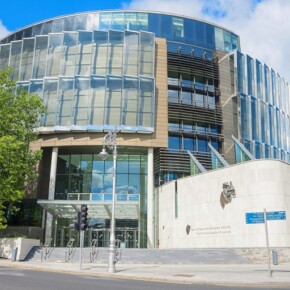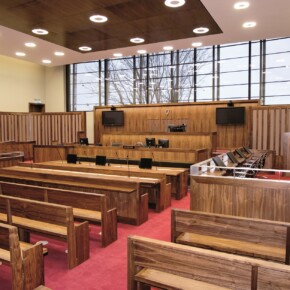Illegal Airbnbs squeezing local renters
Padraig Conlon 26 Nov 2025
At this month’s meeting of South Dublin County Council a stark warning was issued, urging councillors to act.
The message was simple but urgent. If the tide of illegal short term letting is not stemmed, more families, more workers and more young people will be pushed out of their communities.
That warning, delivered by People Before Profit Councillor Darragh Adelaide, set the tone for one of the council’s most urgent housing discussions this year.

Councillor Adelaide (pictured above) had brought forward a motion calling for proactive planning enforcement against properties being rented out on platforms like Airbnb and Booking.ie without the necessary planning permission. It passed.
But the numbers he revealed left the chamber in no doubt that something is deeply wrong.
He pointed out that hundreds of entire homes across Dublin are available for tourists on short term letting sites.
Yet since 2019, South Dublin County Council has granted planning permission to just one property to legally operate as a short term let.
“That shows just how widespread non compliance is, and how urgently enforcement is needed,” he told colleagues.
Under existing regulations, anyone seeking to use a full home for short term letting must apply for planning permission or submit a Form 15 notification to the council if they qualify for an exemption.
Yet according to Councillor Adelaide, only two of these Form 15 notifications have been received in South Dublin since 2019.
For a county facing a severe shortage of long-term rental properties, the scale of unregulated activity is alarming.
“Every whole home rented to tourists is one less home available for workers, families and young people,” he said.
“Landlords can make far more from tourists than from renting to people who want to live and work in the area. That is pushing rents up and driving tenants out.”
He reminded the meeting that stronger national laws had been promised for 2024, but those measures are now delayed until 2026. In his view, the delay leaves councils as the only bodies able to act in the interim.
“Housing is being treated like a commodity rather than a human right,” he said.
He spoke of a national crisis unfolding in plain sight. Young people unable to move out. Low wage workers trapped in cramped rooms. Gaeltacht areas slowly dying because families cannot find a place to live.
To him, the connection between these crises and the rise of short term lets is clear.
Across the country, the impact is growing. Based on April 2025 data from four major booking platforms, an estimated 33000 short term let properties are now being advertised across the State.
Of these, around 64 percent are entire homes or apartments that could otherwise house long term tenants. Councillor Adelaide said the lack of compliance has gone unchecked for far too long.
However, he noted that South Dublin’s 2026 Council budget includes additional resources for the planning enforcement team. That investment, he said, will allow for proactive rather than reactive oversight.
“By taking local action, we are sending a message to the Government that we need change nationally,” he said.
In response, SDCC’s Director of Community Eoin Burke said the Planning and Development Act 2024 will introduce more regulations for short-term lettings including an online registration system and newer penalties.
“The council recognises the challenge and balancing act needed on this issue, we need to balance housing and tourism needs,” Eoin Burke said.
“The new plan will include the criteria and policy that the enforcement team can refer to, to decide whether to grant or not grant permission.”
The council agreed on the motion and called for the local authority to be more proactive about regulating short-term lets.
The move by South Dublin County Council does not stand alone.
It follows a decision by Dublin City Council at the end of September which also focused on the damage unregulated short-term letting is inflicting on Dublin renters.
At the September 23 meeting of Dublin City Council, Labour Councillor Fiona Connelly secured the passing of her motion calling for urgent action to limit the impact of platforms like Airbnb on Dublin’s already strained supply of rental homes.
Speaking after her motion passed, Councillor Connelly did not mince her words. She warned that the rapid rise in short term lets has been draining supply from the rental market and that decisive intervention is now required.
“Airbnb presents a clear issue that is compounding the housing crisis in our city,” she said. She urged Dublin to look abroad for guidance, highlighting how cities across Europe have already taken firm action.
Barcelona, Berlin and Amsterdam have imposed strict limits on short term letting and have seen real benefits in returning homes to the long term market.
By contrast, she argued, Dublin is lagging behind. “Other European countries have shown leadership in tackling this problem, and Dublin must not fall behind,” she said.
Connelly stressed that family homes are increasingly being diverted into holiday lets, creating a damaging imbalance in the city’s rental system. Instead of being available on long term leases, these homes are being pushed into the tourist market, leaving renters with fewer choices and higher rents.
“The reality is that far too many families and individuals are locked out of the rental market because so many properties are being diverted into the short term lettings market,” she said.
“Dubliners deserve secure and affordable homes under fair rental agreements. Without stronger governance, the imbalance between housing for tourists and housing for residents will only worsen.”
Her motion called on Dublin City Council to put proper systems in place to monitor short term letting numbers, clamp down on unregistered properties and return homes to the long term market wherever possible. But she warned that none of this will be possible without serious investment.
“I am calling on Dublin City Council to allocate the necessary resources and funds to strengthen the governance of short term rentals such as Airbnb,” she said. “We need robust enforcement, proper oversight and a fair rental system. The time to act is now.”
Her motion received broad cross party support, reflecting growing unease at the scale of the problem and the speed at which it is escalating. For many renters, the hope now is that both councils will follow through with concrete action and ensure that homes in Dublin are prioritised for the people who need them most.
For South Dublin County Council, the vote this month marks a significant shift. What was once seen as a niche planning issue is now being recognised as a direct threat to housing supply. Councillor Adelaide’s motion places responsibility squarely on the council to act quickly and decisively.
With hundreds of entire homes potentially operating outside the law, councillors now face a challenge.
It is a test of political will in a housing landscape where every home taken out of the long term market has a human consequence.
Families waiting for a place to live.
Young people trying to start independent lives. Workers commuting long distances because they cannot afford to live close to their jobs.
The message from both councils is clear.
The unchecked growth of short term lets is no longer sustainable. The question now is whether enforcement will move fast enough to make a real difference for those still searching for a place to call home.











